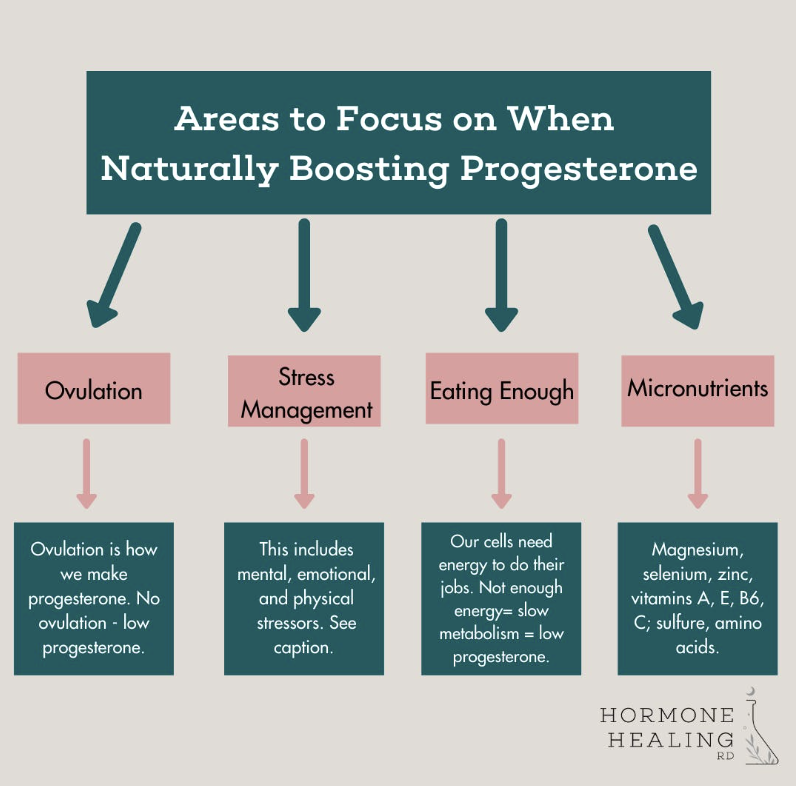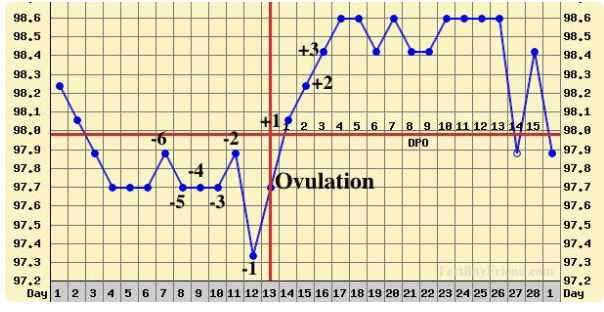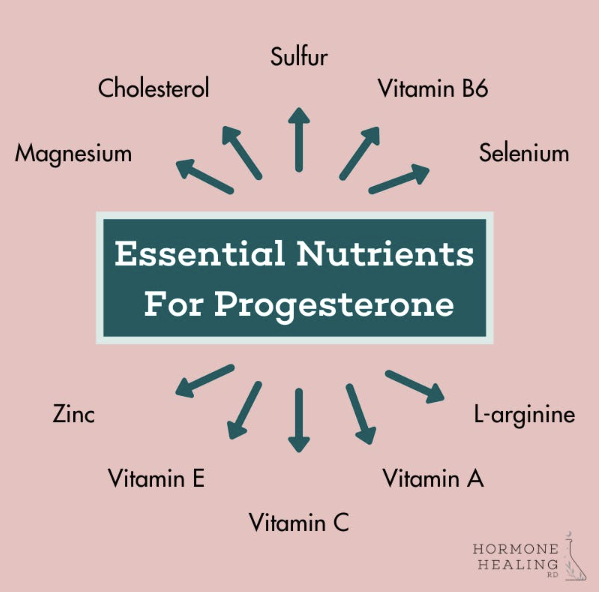
I wrote a guest blog post for Saalt Co about what your period is trying to tell you based on symptoms and length. It was so great to see so many women reading and connecting with their cycles! One of the most common questions I got was how to naturally increase progesterone. And to be honest, this is a loaded question. It’s not a magical food or supplement. Progesterone is hugely impacted by stress, which leads to a more complicated answer than I can provide in a message or comment on social media, so I’m breaking down the basics here!
If I had to breakdown boosting progesterone naturally into a few main areas it would be these:
Let’s dig more into each of these main areas.
Step 1: Ovulation & Tracking Your Cycle
The first step of naturally boosting progesterone is to make sure you’re ovulating every cycle. Ovulation occurs when estrogen surges, and the dominant follicle releases an egg. This is the main event of the menstrual cycle and allows our bodies to balance estrogen and progesterone.
What often happens when we don’t have adequate progesterone is the body is in a stressed state and making more estrogen and less progesterone. When these two are out of balance we experience things like severe PMS symptoms, mood changes, menstrual headaches (or headaches around ovulation), spotting (around ovulation as well), digestive issues, heavy, painful periods, etc.
Tracking Ovulation
To confirm that ovulation has occurred during your cycle, you need to track your basal body temperature. All you need for this is any basal body thermometer. This means it needs to go to the 100th degree (98.67 vs. 98.6). You can find these at places like CVS, Walgreens, Walmart, and Amazon.
What You’re Looking For
We want to see a temperature increase in the second half of the cycle. Once ovulation occurs, the body makes progesterone, and this increases our basal body temperature. It’s not a huge temperature increase that you’re looking for. It’s only about .5F, but when you chart in an app, you can see the difference. See the chart below from Fertility Friend. You need three high temperatures in a row that are higher than the previous 5 to confirm that ovulation has occurred. You can see the clear shift from the follicular phase to the luteal phase when you look at the chart below.

TIP: If you are taking your temperature and feel like your temps are all over the place, hold the thermometer in your mouth for at least a minute prior to taking the temp. This warms up the thermometer and helps you get more consistent temps.
Further Learning Resources:
Step 2: Evaluating Current & Past Stressors
When I talk to clients about healing their hormone imbalances and improving their period symptoms, stress always comes up and can often be a sensitive subject. I’d like to reframe stress a bit before we talk about WHY it matters.
Hans Selye, the original creator of the term stress and stress researcher, defined stress as the following:
“the non-specific response of the body to any demand for change”
Stress is anything that causes our bodies to adapt or change, and it isn’t always a bad thing. Stress is how we evolved. What I find is the most important thing when looking at your current, and past stress is looking at how you respond to stress. Do you find you can’t handle stress like you used to? Do you have current or past mental/emotional stress contributing to how you respond to stress now?
It’s important to get honest with yourself about your current and previous exposure to stress and then look at how you can support your body in handling that stress. I mention previous stressors because many of my clients have reduced and overcome stress in their lives when they come to see me. Just because that stress is gone, doesn’t mean your body automatically rebalances. Many of us have been in a compromised state for an extended period, which means we need to focus on steps 3 and 4 the most to regain that balance (homeostasis) in the body that will support healthy hormone production.
Why Stress Matters
When the body is in a stressed state, there are elevated stress hormones that inhibit certain functions in the body, especially hormone production, since that isn’t looked at as essential for survival. Stress also depletes specific vitamins and minerals that are needed for hormone production (magnesium, vitamin C, and sodium, to name a few)
An Easy Exercise
Pick a day in your calendar and set up some reminders in your phone or via sticky notes that you will easily see to remind you to stop and check-in with yourself throughout the day. The notes can say things like stop and checking, breathe, how are you feeling in your body, etc.
There’s so much noise in our day to day that interferes with our brains getting messages from our bodies on what they need. I know for me personally, I have to set strict boundaries with my phone, email, and social media otherwise, I get stressed, feel like I’m pulled in a million directions, not doing enough, etc. Guess what this does? Puts me in fight or flight mode, crushes my appetite, and ruins my productivity. Checking in with myself and building in breaks throughout my day helps me reduce the chatter, tune in, and make sure I’m meeting my needs.
Further Learning Resources:
Step 3: Nourishing Your Body
Eating enough food is the only way to give your body the energy it needs to perform the functions required for optimal hormone health. I’ve talked about compensation in the past in previous newsletters and how under eating leads to stress, which causes the body to compensate. This stressed state is no different from what’s described above. That’s why eating and balancing blood sugar is the number one way to reduce your stress.
Each of our cells has a tiny engine, this tiny engine requires energy in order to let things inside and out of the cell so it can do its job. When our cells don’t get enough energy, all of those engines slow down. This means hormone production, digestion, detoxification, cognition, all slow down.
I have an entire course specifically on this foundational topic coming out May 27th (at a super accesible price since I think we all deserve access to this kind of information), but here are some basic recommendations for balancing blood sugar that also support eating enough.
Step 4: Minding Your Micronutrients
Prioritizing eating enough is essential for adequate energy for the body, but we also need certain micronutrients. Micronutrients are nutrients we need in small amounts. Although we do need them in small amounts, they are extremely important for overall health. If we look at the nutrients that make up the backbone of progesterone alone, you can see how important it is to make sure you’re eating nutrient dense foods.

Prioritizing Nutrient Dense Foods
Nutrient dense means foods that are not only rich in micronutrients, but also easily absorbed. I mention this because plant based diets have become extremely popular, and while I don’t think plants are bad, I don’t think it’s optimal for our overall health to rely on them for all of our nutrients.
Plants can appear to be rich in certain minerals, however, we don’t absorb 100% of what is in plant food because of the protective mechanisms they have such as phytic acid. Phytic acid binds to minerals in plants, which means we don’t absorb it all. Again, I’m not saying plants are bad, but this is why nutrient deficiencies occur on a completely plant based diet.
Let’s talk about vitamins in animals vs. plants:
I think we need a balance of animal based foods and plant foods in order to meet 100% of our macro and micronutrient needs and allow our bodies to thrive. Here are some of my favorite animal and plant foods to include in a nutrient dense diet:
Remember, although it can be fun to focus on specific micronutrients, if you don’t have the previous 3 steps in place, it likely won’t move the needle for your hormone health.
Want to learn even more about progesterone? Check out my podcast episode How To Boost progesterone levels naturally.
reminder: i’m currently taking on 1:1 clients. if you’d like to explore what it would be like to work together and if we are a good fit, fill out this form to get more details!
